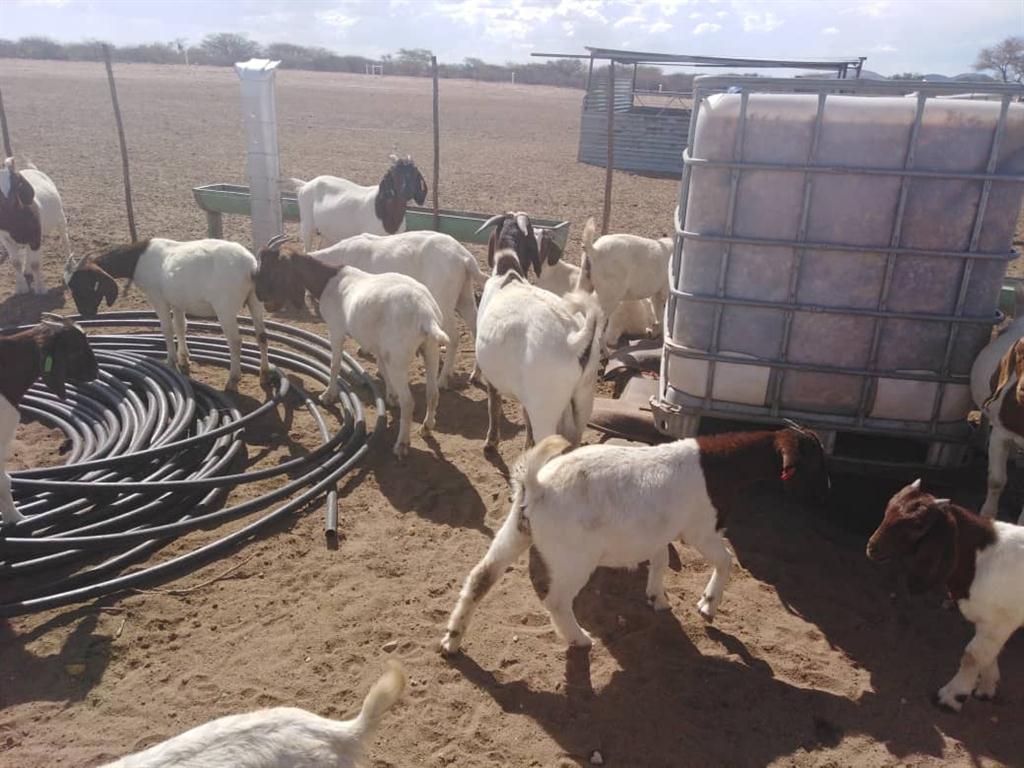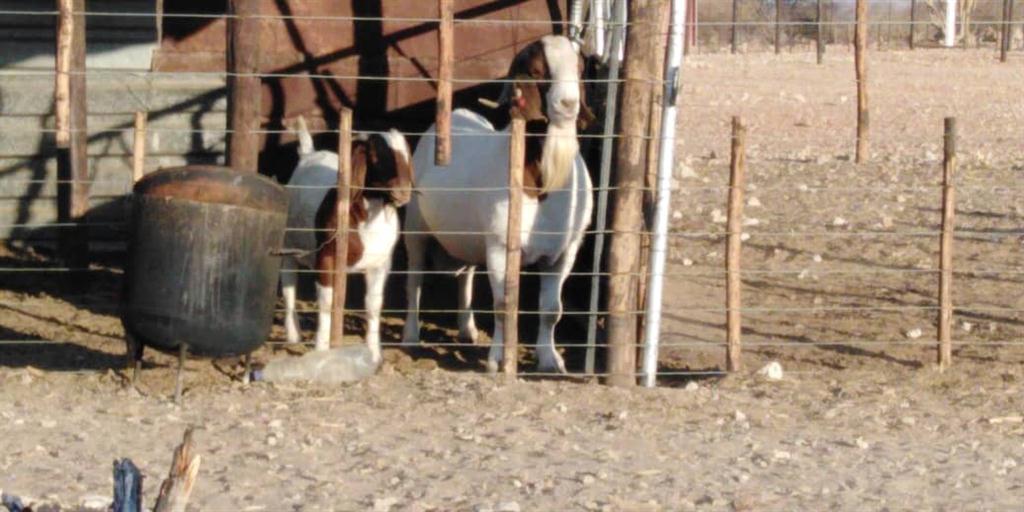'We're going nowhere'
The farmers say they have been settled legally by the traditional authority.
Families settled on Farm Okongava No. 72 are again up in arms after minister Utoni Nujoma said in parliament they are there illegally.
The families have been settled on the 15 160-hectare farm after an initial understanding was reached between the lands ministry and the Tsoaxudaman traditional authority that the farm be used to extend the boundaries of Otjimbingwe, which is one of the smallest communal areas in the country.
The families now say that Nujoma is lying by omission about this arrangement, and have vowed not to move until the government can provide them with an acceptable alternative place. United Democratic Party (UDF) president Apius Auchub asked Nujoma in parliament why he had backpedalled on an earlier decision to have the farm allocated to the Tsoaxudaman authority for the expansion of Otjimbingwe.
Nujoma responded that the Tsoaxudaman authority had taken ownership of the farm in December 2014 purportedly without any directive from the lands ministry. Nujoma also said that camps allocated by the authority to a number of Otjimbingwe farmers was also done without authorisation by, or knowledge of, the ministry.
Nujoma said the ministry has since unsuccessfully tried, through the attorney-general's office, to effect eviction notices.
Angry small-scale farmers
Some of the small-scale farmers last week insisted that they have been properly settled on Farm Okongava and vowed to remain there.
“We are not going anywhere. We will not move an inch come hell or high water,” one of the small-farmers preferring anonymity said. “Minister Nujoma must not threaten us by claiming that we are there illegally. He must go and ask the traditional authority that placed us there. He must also not forget the letters he has sent to the traditional authority.”
Tsoaxudaman chief Joseph Neumbo also vowed that the settled farmers will not move out of the farm.
“These are people who are there legally. They are Namibians, from the Otjimbingwe area, and they will remain there,” Neumbo said.
After the purchase of the farm in 2014 it has been carved up along mining interests and the small-scale farmers fear that their rights to the farm are being compromised in the process.
“We believe they realised that there are minerals on the farm and they do not want to lose out. They are now taking from us and giving to the elite. How long will the poor suffer at the hands of our own government if only the elites are to be resettled or given EPLs [exclusive prospecting licences]?” the small-scale farmer asked.
The background
In April 2014 former lands minister Alpheus !Naruseb suggested that the then recently acquired farm be “availed for the expansion of the Otjimbingwe communal area”.
!Naruseb then said necessary arrangements would be made for the gazetting of the farm as a communal area.
On 10 August 2015 the new lands minister Nujoma wrote to Erongo governor Cleophas Mutjavikua that the ministry was in the final stages of this process, pointing out that there were technical processes that needed to be finalised.
“It is envisaged that once finalised this farm will benefit the community of Otjimbingwe through alleviating the grazing pressure and general population decongestion of the aforesaid communal area. It is also the thinking of the ministry that this farm be allocated to successful farmers and those with a large number of livestock from the Otjimbingwe area, to address the challenges associated with the prevailing grazing and carrying circumstances,” Nujoma wrote in the letter.
The Tsoaxudaman authority in August 2015 started to settle at least 28 families in different camps on the farm, but on 15 January 2016 the ministry advertised the farm for resettlement purposes.
The late chief Betuel Haraseb expressed shock and disappointment and asked Nujoma to withdraw this advert.
The community sought an audience with President Hage Geingob, and was referred to former vice-president Nickey Iyambo who promised to take up the matter with Prime Minister Saara Kuugongelwa-Amadhila.
Kuugongelwa-Amadhila then wrote a letter to chief Haraseb on 24 August 2016 to say that transfer of the farm to the community was receiving the land ministry's attention.
However, the small-farmers got eviction notices from the attorney-general in March 2017.
CATHERINE SASMAN
Catherine Sasman
The families have been settled on the 15 160-hectare farm after an initial understanding was reached between the lands ministry and the Tsoaxudaman traditional authority that the farm be used to extend the boundaries of Otjimbingwe, which is one of the smallest communal areas in the country.
The families now say that Nujoma is lying by omission about this arrangement, and have vowed not to move until the government can provide them with an acceptable alternative place. United Democratic Party (UDF) president Apius Auchub asked Nujoma in parliament why he had backpedalled on an earlier decision to have the farm allocated to the Tsoaxudaman authority for the expansion of Otjimbingwe.
Nujoma responded that the Tsoaxudaman authority had taken ownership of the farm in December 2014 purportedly without any directive from the lands ministry. Nujoma also said that camps allocated by the authority to a number of Otjimbingwe farmers was also done without authorisation by, or knowledge of, the ministry.
Nujoma said the ministry has since unsuccessfully tried, through the attorney-general's office, to effect eviction notices.
Angry small-scale farmers
Some of the small-scale farmers last week insisted that they have been properly settled on Farm Okongava and vowed to remain there.
“We are not going anywhere. We will not move an inch come hell or high water,” one of the small-farmers preferring anonymity said. “Minister Nujoma must not threaten us by claiming that we are there illegally. He must go and ask the traditional authority that placed us there. He must also not forget the letters he has sent to the traditional authority.”
Tsoaxudaman chief Joseph Neumbo also vowed that the settled farmers will not move out of the farm.
“These are people who are there legally. They are Namibians, from the Otjimbingwe area, and they will remain there,” Neumbo said.
After the purchase of the farm in 2014 it has been carved up along mining interests and the small-scale farmers fear that their rights to the farm are being compromised in the process.
“We believe they realised that there are minerals on the farm and they do not want to lose out. They are now taking from us and giving to the elite. How long will the poor suffer at the hands of our own government if only the elites are to be resettled or given EPLs [exclusive prospecting licences]?” the small-scale farmer asked.
The background
In April 2014 former lands minister Alpheus !Naruseb suggested that the then recently acquired farm be “availed for the expansion of the Otjimbingwe communal area”.
!Naruseb then said necessary arrangements would be made for the gazetting of the farm as a communal area.
On 10 August 2015 the new lands minister Nujoma wrote to Erongo governor Cleophas Mutjavikua that the ministry was in the final stages of this process, pointing out that there were technical processes that needed to be finalised.
“It is envisaged that once finalised this farm will benefit the community of Otjimbingwe through alleviating the grazing pressure and general population decongestion of the aforesaid communal area. It is also the thinking of the ministry that this farm be allocated to successful farmers and those with a large number of livestock from the Otjimbingwe area, to address the challenges associated with the prevailing grazing and carrying circumstances,” Nujoma wrote in the letter.
The Tsoaxudaman authority in August 2015 started to settle at least 28 families in different camps on the farm, but on 15 January 2016 the ministry advertised the farm for resettlement purposes.
The late chief Betuel Haraseb expressed shock and disappointment and asked Nujoma to withdraw this advert.
The community sought an audience with President Hage Geingob, and was referred to former vice-president Nickey Iyambo who promised to take up the matter with Prime Minister Saara Kuugongelwa-Amadhila.
Kuugongelwa-Amadhila then wrote a letter to chief Haraseb on 24 August 2016 to say that transfer of the farm to the community was receiving the land ministry's attention.
However, the small-farmers got eviction notices from the attorney-general in March 2017.
CATHERINE SASMAN
Catherine Sasman





Comments
Namibian Sun
No comments have been left on this article